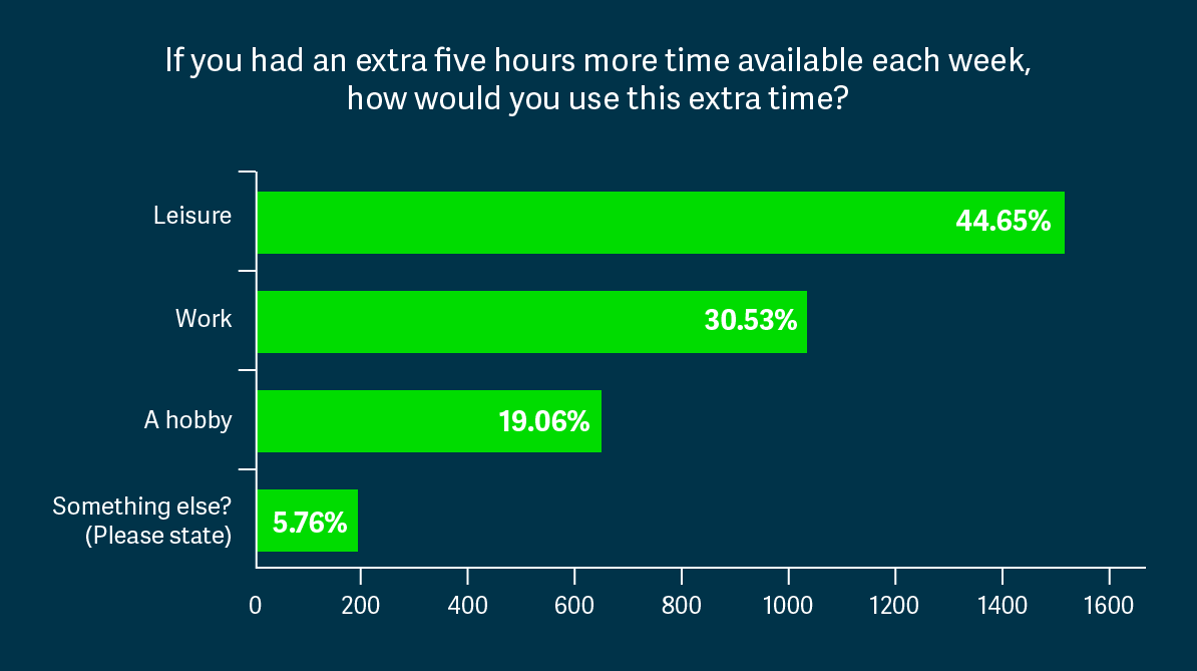Here’s what businesses would do with an extra 5 hours a week
What would you do with an extra five hours a week? We recently surveyed 3,666 Sage UK customers and asked them what they’d do with an extra five hours a week. Many of these customers run small or medium-sized businesses in the UK. They also use accounting software. We found 44.65% of respondents said they would spend […]

What would you do with an extra five hours a week? We recently surveyed 3,666 Sage UK customers and asked them what they’d do with an extra five hours a week. Many of these customers run small or medium-sized businesses in the UK. They also use accounting software.
We found 44.65% of respondents said they would spend it on leisure. Examples included studying for a degree or spending time with their spouse.
Diane Middelton of COS Bookkeeping says: “If I had an addition five hours of time per week, I would split it between work and leisure. In terms of work, I would spend some time working on our cash flow and budgets and additional leisure time would be doing an additional exercise class or a walk.”
Meanwhile, 30.53% of respondents said would spend it working on their business. Examples included marketing their website and building relationships with customers.
Janet Halliwell of Pink Penguin Photobooths is just one respondent who admitted she’d like to spend more time working on her business. She says: “I am almost constantly working at the moment and never seem to have enough time to do all the things I need to do.”
There were 19.06% of respondents who said they would spend this free time on a hobby. Examples included golf and gardening.
Paul Donno, managing director of 1 Accounts, says: “If I had more time I would try and play golf more, this is a great de-stress from a work point of view even if it goes wrong. This year my business has really taken off and I haven’t played golf much or had much leisure time, hopefully it will change next year.”
There were 5.76% of respondents who said they would spend this free time on something else. Examples included sleep and housework.

We also recently asked 3,000 small and medium-sized businesses what type of admin tasks they’re spending time on. Here are the results:
- 36% spend time on payments processing
- 20% spend time on invoices and chasing payments
- 20% spend time on payroll and people management
- 10% spend time on talent acquisition and training
How are business owners around the world spending their time?
In our 2017 report, Sweating the Small Stuff, we found business owners and entrepreneurs in the UK and abroad currently spend an average of 120 working days per year on administrative tasks.
For that report, business from Australia, Brazil, Canada, France, Germany, Ireland, Singapore, South Africa, Spain, the UK and US were surveyed. The research shows an increase in productivity of 5.6% in the UK could lead to an increase in GDP of at least £33.9bn per year.
This could be partially achieved through the reduction of time spent on business administration.
The largest administrative task for small and medium-sized businesses in the UK is accounting, with operational tasks such as recruitment and HR representing a smaller burden for entrepreneurs.
For Sweating the Small Stuff: the impact of the bureaucracy burden, we researched more than 3,000 business builders around the world.
This report found that complying with administrative and regulatory requirements has a significant impact, both in terms of manpower that must be devoted to the tasks and the actual cost to the bottom line.
The report also found time spent on accounting is most costly, amounting to more than 20% of total administration time, and up to 27% of time in France. This is followed by generating invoices and taxation.
So how can you reduce the amount of time you’re spending on these tasks and claim back five hours a week to spend on your business, a hobby or something else?
How to find an extra five hours a week
Regardless of the size of your business, saving just five hours a week on admin will help you become more productive, find time for personal pursuits and even scale up. Here are three things you can try.
1. Delegate like a pro
You can only accomplish so much within your business alone because success involves a team. So identify processes that rely on your unique skills and then ask team members to perform other tasks.
For example a particular customer account may drive the bulk of your revenue and require your attention. Similarly, you may also want to vet a key hire. But you probably could ask another team member to look after customer support or procurement.
2. Outsource low-value tasks
If your business is smaller, you can still save time by contracting a third party to perform low-value admin tasks. Spend some time encapsulating in writing what tasks you want the contractor to complete, taking care to be as clear as possible.
Sites such as Upwork are useful for finding contractors on a budget. You could, for example, find a designer to create a logo for your website on a budget. Alternatively, consider outsourcing to a local business. The likes of Trustpilot and Sitejabber provide user reviews of many businesses if you’re unsure. Another options is to consult the Trading Standards office for the region where a business is located.
3. Use cloud services
Using cloud software for file storage, payments and accounting will help you work on the go using any device. You won’t have to worry about painful backups or upgrades either. Most cloud services simplify the process of business admin and are more affordable than desktop counterparts. These cost savings will enable you to invest in other areas of your business, such as outsourcing or new hires.
Sage Business Cloud
Need help with VAT? Sage Business Cloud can help you pay employees and comply with HMRC easily.






